Northwestern’s Class of 2023: Grads to Watch in Energy and Sustainability
Learn about those among the next generation of leaders, many of whom have come through programs at the Paula M. Trienens Institute for Sustainability and Energy
Hats off to the Class of 2021! What a year it has been. Despite it all, graduates are quickly finding their way into leadership roles in energy and sustainability. Learn more about their pursuits below.
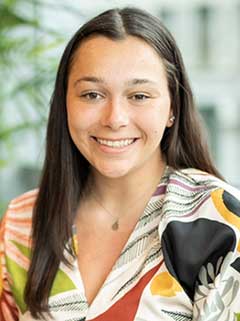
Rachel Deradoorian graduated in June 2021 with a master’s in energy and sustainability – a degree administered by ISEN and conferred by the McCormick School of Engineering.
What are your plans after graduation?
I will continue my career at Buro Happold Engineering as a member of the sustainability team, working on projects at the building scale dealing with issues of electrification and decarbonization, as well as masterplan-level projects to support decarbonization at scale.
How will you pursue energy and/or sustainability in your work and why is this work meaningful for you?
Work within the E&S sphere is imperative to inform issues of energy equity and the intricate humanity relationship with decarbonization. This work is incredibly meaningful as it enables tactical strategies for achievement of environmental and economic development.
What did you learn at Northwestern that you expect to carry with you into the future?
Northwestern has taught me to develop strategies that inform the problems of today and into the future. I plan to continue being led with passion and curiosity, truly leaning in to the aspects of learning that continue to motivate the sustainability strategy.
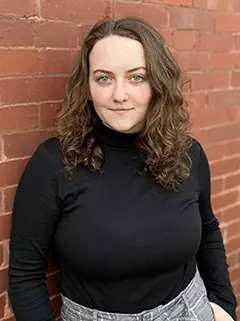
Simone Laszuk graduated in June 2021 with a master’s in energy and sustainability.
What are your plans after graduation?
Working at Deloitte on their sustainability team!
How will you pursue energy and/or sustainability in your work and why is this work meaningful for you?
Deloitte has such a wide variety of clients, which makes me incredibly excited to join a team where my work can make a tangible impact. This team is on the forefront of change in the industry and I get to contribute to this groundbreaking work!
What did you learn at Northwestern that you expect to carry with you into the future?
I have met incredible mentors, created a wonderful network of intelligent and passionate people, and I am excited to bring the excitement and knowledge I have cultivated here into future pursuits. I have been so fortunate to be in the first cohort of the MSES program, which has really allowed me to choose a unique combination of electives and created a wonderful toolkit of knowledge. I am looking forward to growing my career and will rep Northwestern, as a double-grad, everywhere I go!
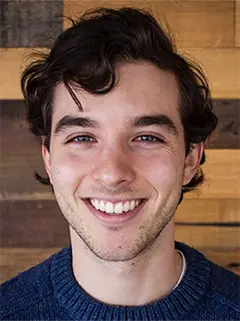
Austin Mertz graduated in June 2021 with a master's in business administration with a major in management science from the Kellogg School of Management.
What are your plans after graduation?
I’ll be joining Tesla as a business operations associate. I interned with this team last summer, focusing on FP&A work for solar retrofit and Megapack.
How will you pursue energy and/or sustainability in your work and why is this work meaningful for you?
Of all the major challenges facing our world today, few are as dire and far-reaching as climate change. Overcoming this challenge will require an urgent transition to sustainable energy. I’ve chosen a career in clean energy technology in order to contribute to this effort. This goal will be at the core of my work at Tesla – whether that’s electrifying transportation or greening the grid.
What did you learn at Northwestern that you expect to carry with you into the future?
Northwestern has taught me so much. The Kellogg core curriculum has helped immensely in rounding out my knowledge of business fundamentals. I’m also glad to have taken energy-focused electives such as ISEN 440 and Meghan Busse’s Economics of Energy Markets; these courses have offered useful deep dives into project finance and wholesale markets.
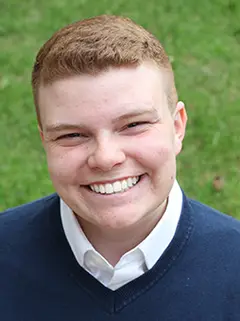
Maggie Olson graduated in December 2020 with a bachelor’s degree in communication studies and a minor in environmental policy and culture.
What are your plans after graduation?
I am working at Illinois Green Alliance, a nonprofit that advances the green building industry, as the Communications Associate.
How will you pursue energy and/or sustainability in your work and why is this work meaningful for you?
Illinois Green convenes green building professionals from across Illinois in support of education, policy, and offers volunteering opportunities for professionals to give back. I’m excited to help share information about how this industry can decarbonize and help build market support for that. The built environment has great potential to improve to build resilience against climate change and reduce GHG emissions, and there’s a lot of momentum in Chicago. Additionally, there are a lot of intersections with equity through energy efficient affordable housing and it’s been amazing to see how passionate people are about creating buildings that improve lives, not just reduce environmental impact.
What did you learn at Northwestern that you expect to carry with you into the future?
Northwestern showed me all the sides of sustainability and environmental work — from the technical to the historical. My biggest takeaway is that sustainability is embedded into every part of life, and requires input from all disciplines to build the most holistic solutions. Working at sustainNU gave me a lot of insight into the importance of engagement in sustainability work. I got to talk to a lot of students and staff and raise awareness for ways to move towards a sustainable work environment — not just through individual action but as a collective. My science communication course also showed me how the most effective approach in talking to people about climate, science, or any other topic is through empathy and narrative, and I incorporate this in my work now through storytelling.
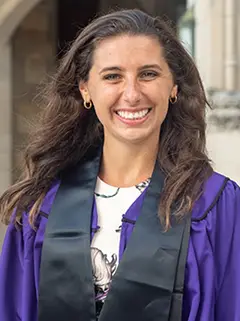
Tess Russell graduated in June 2021 with a master’s in environmental engineering. She earned her bachelor’s in environmental engineering and an ISEN Certificate in 2020.
What are your plans after graduation?
I plan to work for the Air Enforcement and Compliance Assurance Branch at the EPA in Chicago
How will you pursue energy and/or sustainability in your work and why is this work meaningful for you?
By enforcing the Clean Air Act as an inspector at the EPA, I will be ensuring companies are held to their air pollution permit standards and all federal regulations. Sustainability is at the core of this work. It's important to me that companies are held to high standards and not wrongly polluting our environment. This work is especially meaningful to me because I remember driving down I-55 here in Chicago as a kid, looking up at the smokestacks and wondering how it was allowed for the companies to be emitting so much pollution. I remember wanting to change this. I just sort of landed this inspector role at the EPA by chance, but so far I am loving it. I think I would be making my younger self proud.
What did you learn at Northwestern that you expect to carry with you into the future?
You can learn so much from the people around you, so always be open to collaboration and critique. Also, never be too busy to be a friend, to help a friend, or to spend time with friends.
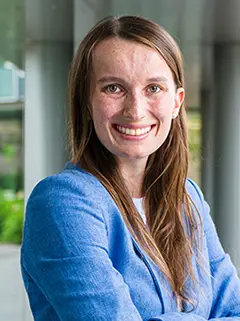
Lauren Simitz graduated in June 2021 with a double major in chemical & biological engineering and Earth & planetary science, with a Segal Design Certificate
What are your plans after graduation?
I will be attending Stanford University for my PhD in Aeronautics and Astronautics. I will be pursuing my PhD on full funding through a combination of a National Science Foundation (NSF) Graduate Research Fellowship, a Stanford Graduate Student Fellowship (SGF), and a Stanford Enhancing Diversity in Graduate Education (EDGE) Fellowship. I'm excited to further research that advances space propulsion and the next generation of sustainable energy systems—for Earth and beyond. Prior to my PhD, I will be returning to SpaceX this summer as an associate engineer on the Propulsion Engineering Team in Cape Canaveral, Florida.
How will you pursue energy and/or sustainability in your work and why is this work meaningful for you?
My PhD focus will build on the sustainability focus of my undergraduate degrees to design propulsion systems that prioritize the environment (use less fuel, produce less emissions or ones with lower GHG potential, use greener fuels) while not compromising performance. Furthermore, the fundamental processes I hope to research — like combustion kinetics and fluid mechanics — are not just applicable to aircraft and spacecraft but also how we produce energy more broadly. I also aspire to continue environmental advocacy through involvement with the Prescott Institute of Energy, Graduate Student Council, and in the surrounding Bay Area community.
What did you learn at Northwestern that you expect to carry with you into the future?
I use (and will continue to use) my engineering and science background from my coursework and projects constantly - both to understand the natural world and develop systems to protect it, or at least lessen our harm to it. What stands out to me most powerfully was my role as ASG's Sustainability chair and as a project manager in ESW. I will take the learnings I have gained from collaborating with people of different backgrounds, disciplines, and roles to make change on our campus far beyond Northwestern to combat global environmental problems.
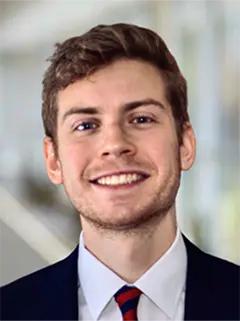
Ben Sych graduated in June 2021 with a masters in energy and sustainability.
What are your plans after graduation?
After graduating from Northwestern, I look forward to joining the project development group at Enel Green Power, where I will be managing the development of wind and solar assets in the Midwest, particularly in Illinois. I will also continue to work on an agriculture-tech startup that I co-founded with two of my fellow ISEN students: Agroco. I will remain here in Chicago.
How will you pursue energy and/or sustainability in your work and why is this work meaningful for you?
I have been fascinated by the ways that we make and use energy since my adolescence, in large part due to the growing number of wind farms near my childhood home. Thus, joining a renewable energy developer always seemed like the logical choice for a career. While the macro-level challenge of resolving our climate crisis has served as a baseload-motivation for my work, I am also interested in the lasting economic development that renewable energy projects bring to rural communities. Deploying these assets across the midwestern United States, a region that I have much fondness for, will bring me great satisfaction.
What did you learn at Northwestern that you expect to carry with you into the future?
The common thread that binds my experience at Northwestern is the curricular-focus on the criticality of energy and sustainability in the world of today. I’ve learned that this topic is no longer an isolated subject; it has permeated society and commerce in ways previously thought unimaginable. And while the diversity of coursework here was sometimes dizzying, several faculty members went to great lengths to ensure that students recognized why the content mattered, and importantly, how it applies to what we will do as professionals. Indeed, while I hold these professors in high respect, I feel particularly indebted to many of my peers, who continue to inspire my work — and who I am certain will go on to have many extraordinary accomplishments.
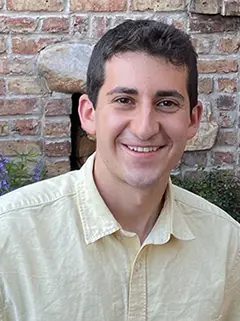
Samuel Wegner graduated in June 2021 with a master’s in energy and sustainability (MSES).
What are your plans after graduation?
I will be pursuing a PhD at the University of Sydney where I will work in partnership with the first company to commercialize Direct Air Carbon Capture technology in Australia.
How will you pursue energy and/or sustainability in your work and why is this work meaningful for you?
In my pursuit of a PhD, I will be researching Negative Emissions Technologies, specifically Direct Air Capture, which is a carbon removal solution that captures carbon dioxide out of the ambient air. This technology is still in its infancy, so my research will focus on the suite of policies that will supply adequate R&D funding and governmental incentives, which are both needed to scale the technology to required levels.
What did you learn at Northwestern that you expect to carry with you into the future?
The MSES program gave me a foundational understanding of the current state of global warming; I learned that the most up-to-date climate models show that global warming will likely rise above the critical 1.5°C temperature threshold, which has provided me with a greater sense of urgency and purpose that I want to apply to Negative Emissions Technologies. More broadly, the MSES program has connected me with a cohort of mission-driven, intelligent, and strong-willed people that will apply our deep knowledge of decarbonization to many different industries.